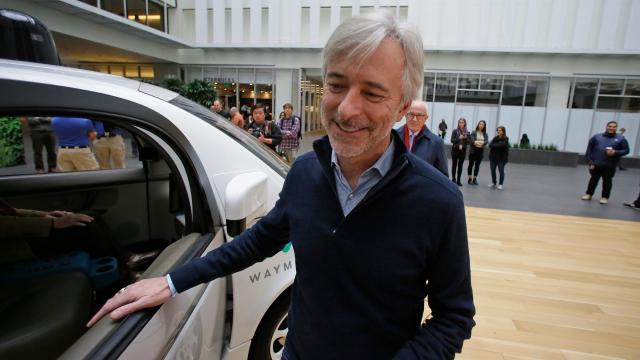Self-driving test vehicles are already on the roads in several US states, including California, Arizona and Massachusetts, but the futuristic world of robot cars on every street hasn’t materialised quite yet. People are still freaked out by the idea of getting in a car that doesn’t have anyone behind the wheel — and so companies in the autonomous vehicle business are launching their own charm offensives to convince consumers (and members of Congress) that their cars will make the world a safer place.
Waymo CEO John Krafcik prepares to step inside a driverless car during a Google event. Photo: AP
Waymo, the self-driving car unit owned by Google’s parent company Alphabet, kicked off its initiative today. It goes by the after-school special moniker “Let’s Talk About Self-Driving“, and is intended to “increase education and understanding about how this new technology can help address some of the biggest safety challenges on our roads today,” Waymo CEO John Krafcik explained.
The campaign has Waymo partnering with organisations such as Mothers Against Drunk Driving and the National Safety Council to talk up the safety features of self-driving cars, both on a new website and in advertisements running in Phoenix, where Waymo tests its vehicles.
[referenced url=”https://gizmodo.com.au/2017/05/self-driving-cars-feel-like-death-traps-can-we-be-convinced-otherwise/” thumb=”https://i.kinja-img.com/gawker-media/image/upload/t_ku-large/toeabb1g2nlviuhoclb5.jpg” title=”Self-Driving Cars Feel Like Death Traps – Can We Be Convinced Otherwise?” excerpt=”Since we’re all friends here on the internet, I’ll let you in on a little secret. I hate driving. I drive too slowly, lurch violently when I change lanes, and the thought of having to merge onto a speeding California highway makes my heart speed up a little even as I write this. I’m no good at driving and never have been.”]
Waymo’s arch-rival Uber has a similar campaign underway called FASTR, a partnership with Intel and several cybersecurity companies that’s focused on improving security throughout the complex network of manufacturers that make components for vehicles and bringing more cybersecurity engineers into the employment pipeline. (Intel even rolled out a self-driving car commercial starring LeBron James, for some reason.)
The initiatives might seem fluffy, but they’re necessary steps for autonomous vehicle makers to take if they’re going to earn trust with consumers. Out of 1000 people polled by the insurer American International Group Inc., three-quarters believed that self-driving cars were at risk of being hacked. A survey by AAA found that the majority of Americans are afraid of self-driving cars. The public has strong preconceptions about just how safe these cars can be, and companies rightly worry that those fears will turn into legislation that’s adverse to self-driving cars.
So far, Congress has been fairly gentle, in part because autonomous vehicles aren’t really finished yet. Everything that’s on the road today is a bit of a prototype, and the autonomous vehicle industry argues that to make strict rules now would be akin to Congress legislating a loaf of bread while it’s still a lump of dough.
But all it takes to change that is a couple of wrecks in one player’s fleet of self-driving cars. To avoid that kind of PR calamity, companies are bound to keep telling us their relatively untested cars are definitely going to be safe.
